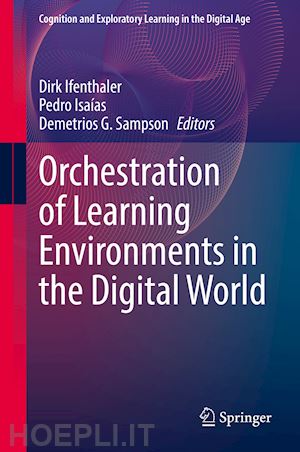
Questo prodotto usufruisce delle SPEDIZIONI GRATIS
selezionando l'opzione Corriere Veloce in fase di ordine.
Pagabile anche con Carta della cultura giovani e del merito, 18App Bonus Cultura e Carta del Docente
This volume focuses on the implications of digital technologies for educators and educational decision makers that are not widely represented in the literature. The chapters contained in the volume are based on the presentations at the 2020 edition of the CELDA conference and cover multiple developments in the field such as deploying learning technologies, proposing pedagogical approaches and practices to address digital transformation, and presenting case studies of specific technologies and contexts. The chapters form a lively debate and provide a comprehensive analysis of the contribution of learning technologies designed to improve the learning process and the experience of the students as well as to develop key competences.
Dirk Ifenthaler is Professor and Chair of Learning, Design and Technology at University of Mannheim, Germany and UNESCO Deputy Chair of Data Science in Higher Education Learning and Teaching at Curtin University, Australia. His previous roles include Professor and Director, Centre for Research in Digital Learning at Deakin University, Australia, Manager of Applied Research and Learning Analytics at Open Universities, Australia, and Professor for Applied Teaching and Learning Research at the University of Potsdam, Germany. He was a 2012 Fulbright Scholar-in-Residence at the Jeannine Rainbolt College of Education, at the University of Oklahoma, USA. Dirk’s research focuses on the intersection of cognitive psychology, educational technology, data analytics, and organisational learning. His research outcomes include numerous co-authored books, book series, book chapters, journal articles, and international conference papers, as well as successful grant funding in Australia,Germany, and USA. He is the Editor-in-Chief of the Technology, Knowledge and Learning, Senior Editor of Journal of Applied Research in Higher Education, and Deputy Editor-in-Chief of International Journal of Learning Analytics and Artificial Intelligence for Education.
Pedro Isaías is an associate professor at the Information Systems & Technology Management School of The University of New South Wales (UNSW – Sydney), Australia. Previously he was an associate professor at The University of Queensland, Brisbane, Australia. Before moving to Australia, he was also an associate professor at the Universidade Aberta (Portuguese Open University) in Lisbon, Portugal, where he was responsible for several courses and director of the master degree program in Management / MBA. Pedro was director of the master degree program in Electronic Commerce and Internet for 10 years. He is co-founder and president of IADIS – International Association for Development of the Information Society, a scientific non-profit association. He holds a PhD in Information Management (in the specialty of information and decision systems) from the New University of Lisbon. Author of several books, book chapters, papers and research reports, all in the information systems area, he has headed several conferences and workshops within the mentioned area. He has also been responsible for the scientific coordination of several EU funded research projects. He is also member of the editorial board of several journals and program committee member of several conferences and workshops. Currently he conducts research activity related to MIS in general, and more specifically Learning Technologies, Data Analytics, Business Intelligence, Digital Transformation, e-Business and WWW related areas.
Demetrios G. Sampson is a Professor of Digital Systems for Learning and Education at the Department of Digital Systems, University of Piraeus, Greece, where he serves as Academic Staff since 2001, and a Professor of Learning Technologies at the School of Education, Curtin University, Australia since 2015. He is the co-author of 340 articles in scientific books, journals and conferences, and the editor of 12 books, 32 special issues and 35 international conference proceedings. He has received 10 times Best Paper Award in International Conferences. He has been a Keynote/Invited Speaker/Lecturer in 85 International/National Conferences and/or Postgraduate Programs around the world. He has been project director, principal investigator and/or research consultant in 70 Research and Innovation projects with external funding at the range of 16 M€. He has supervised 155 honors and postgraduate students to successful completion. He has developed and delivers the first MOOC on the use of Educational Data Analytics by School Teachers (Analytics for the Classroom Teacher), offered by the edX platform which has attracted more than 12000 participants from160 countries around the world since October 2016. He served as Editor-in-Chief of one of the first open access journals in educational technology, the Educational Technology & Society Journal, 2003-2018. He has also served or serves as Member of the Steering Committee and/or Advisory and/or Editorial Board of 25 International/National Journals, in various leadership roles in 75 International Conferences and at the Program Committee of 525 International/National Conferences. He is the recipient of the IEEE Computer Society Distinguished Service Award (July 2012) and named a Golden Core Member of IEEE Computer Society in recognition of his contribution to the field of Learning Technologies (January 2013). He is also the recipient of the Golden Nikola Tesla Chain Award of the International Society for Engineering Pedagogy (IGIP) for "International outstanding achievements in the field of Engineering Pedagogy" (September 2018)











Il sito utilizza cookie ed altri strumenti di tracciamento che raccolgono informazioni dal dispositivo dell’utente. Oltre ai cookie tecnici ed analitici aggregati, strettamente necessari per il funzionamento di questo sito web, previo consenso dell’utente possono essere installati cookie di profilazione e marketing e cookie dei social media. Cliccando su “Accetto tutti i cookie” saranno attivate tutte le categorie di cookie. Per accettare solo deterninate categorie di cookie, cliccare invece su “Impostazioni cookie”. Chiudendo il banner o continuando a navigare saranno installati solo cookie tecnici. Per maggiori dettagli, consultare la Cookie Policy.